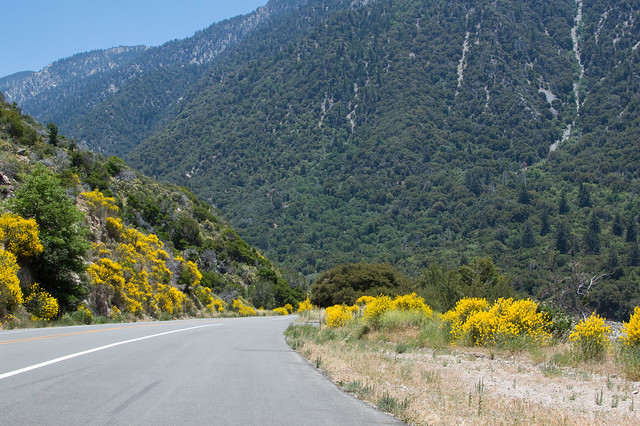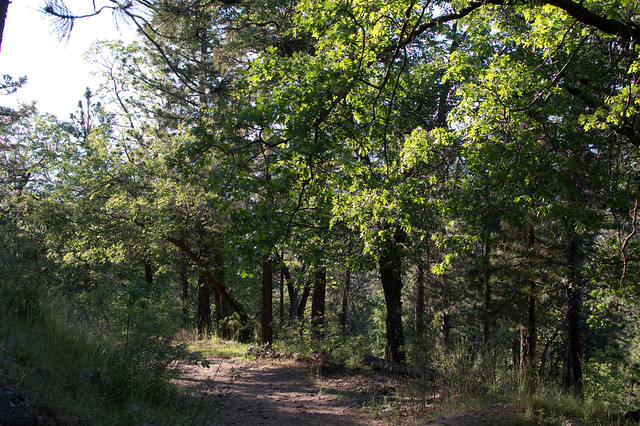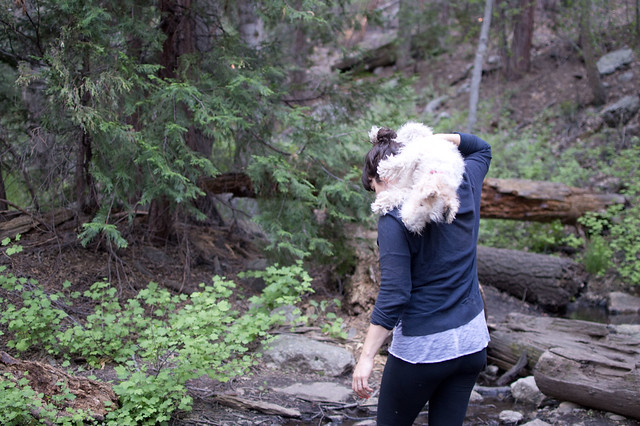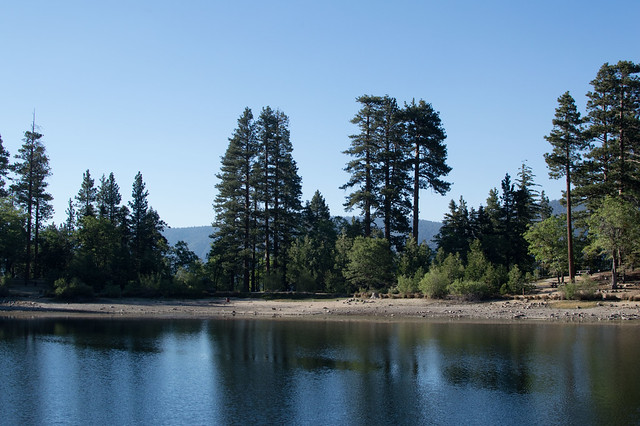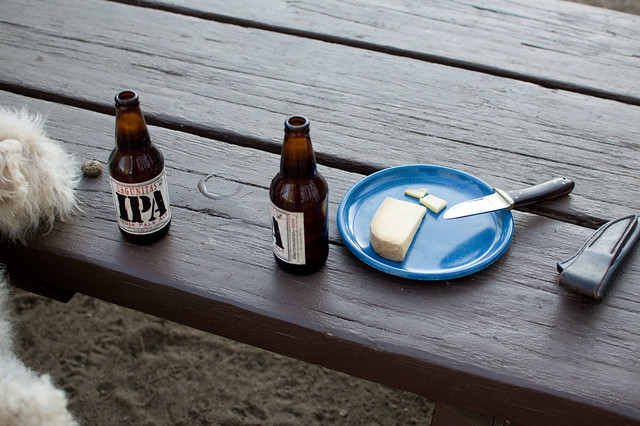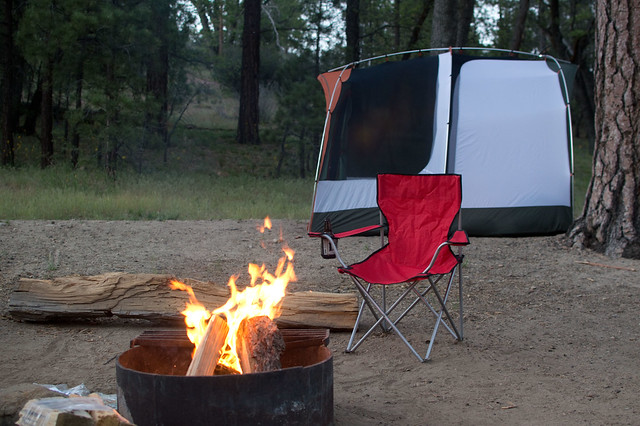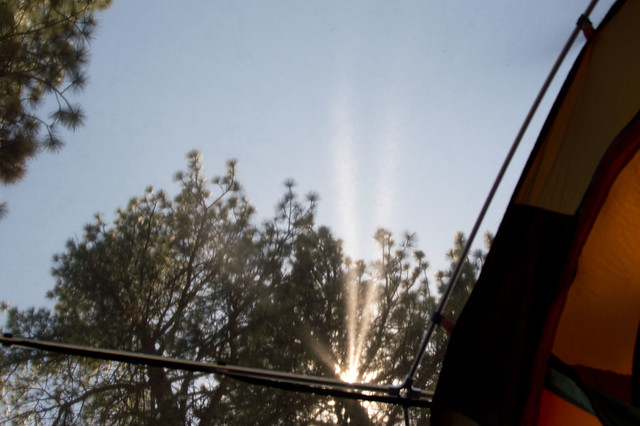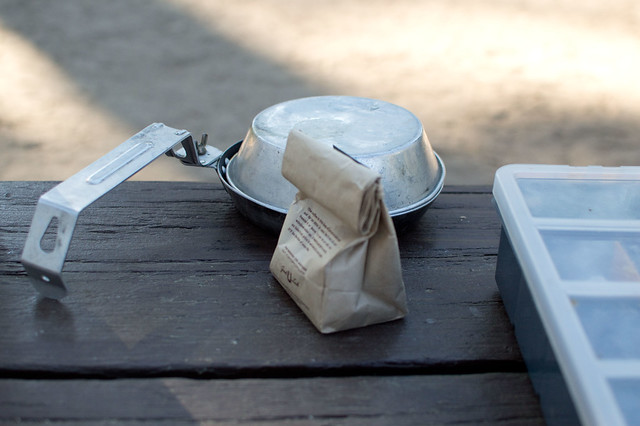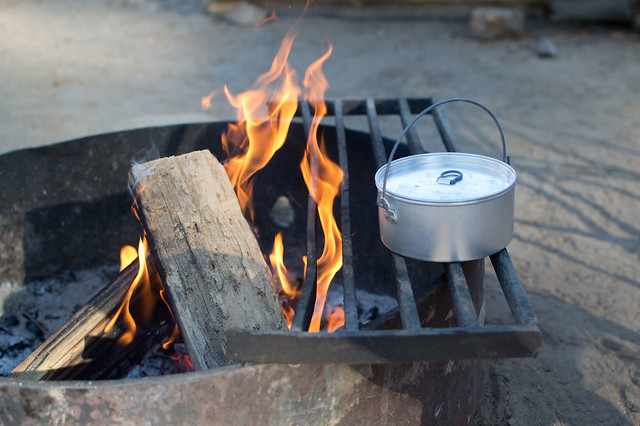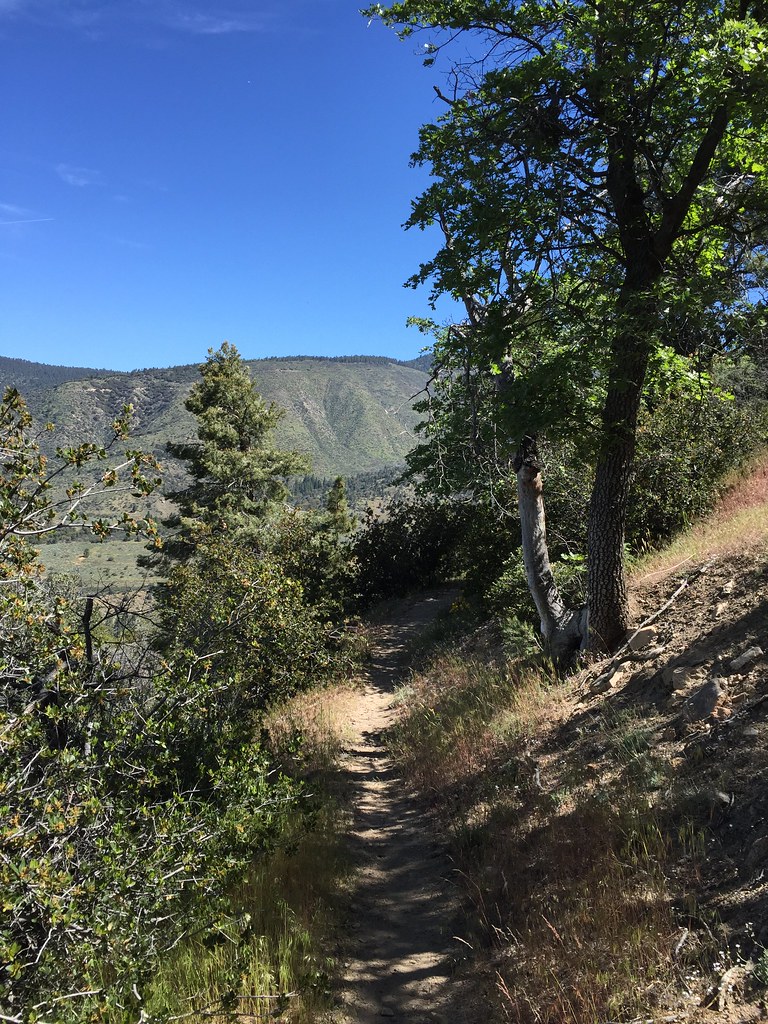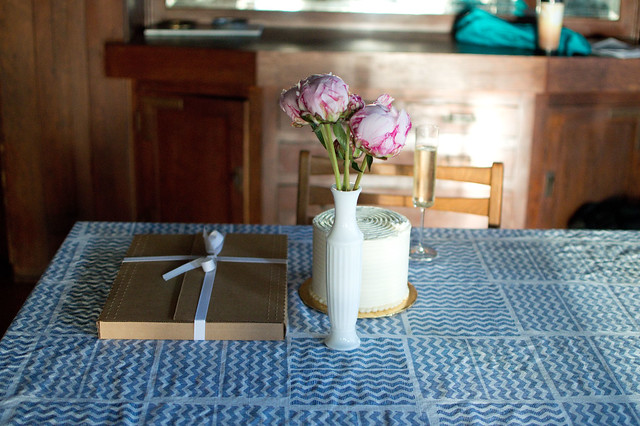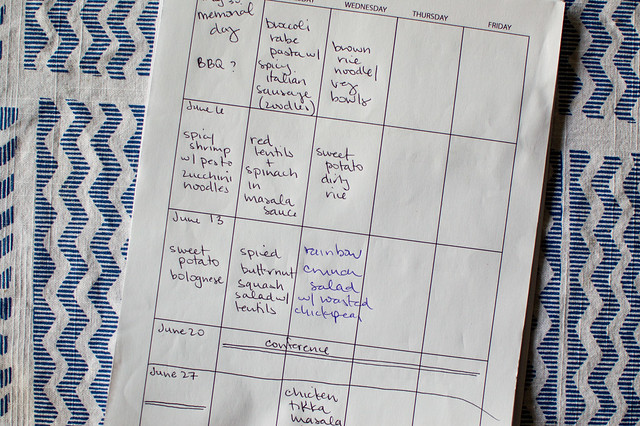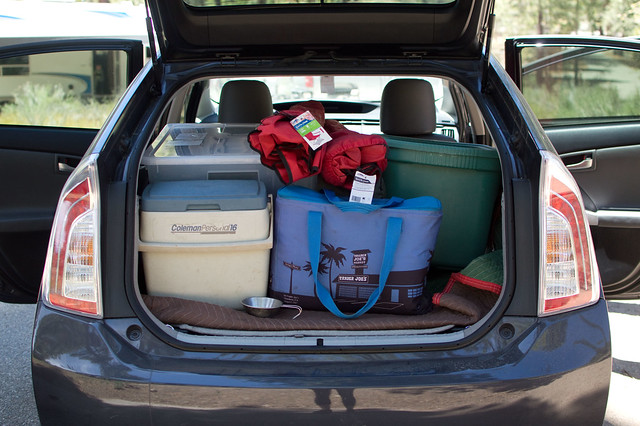
So the bad news about short camping trips is that you have to pack almost as much stuff for one night as you would for a week. You still need almost all the same equipment, just less food and clothing.
The good news is that if you're car camping, you can make the packing process pretty easy on yourself. The main thing is to stop worrying about maximum efficiency. We don't bother cramming sleeping bags into stuff sacks or neatly packing everything up. We just dump it all into bins. We have two dedicated camping bins in our closet that store almost all our camping stuff and a short list of extras that need to get tossed in before we leave (chairs, tent, food, pillows). All in all, we can get the car loaded and be out the door in less than 30 minutes if we mean business, and that includes dragging everything out and throwing some clothes in a duffel. For these one night trips we keep the food super simple and routine, which means we know exactly what we need. We just do scrambled eggs + sausage + coffee for breakfast, sandwiches for lunch, hot dogs for dinner, s'mores for dessert. I have a set grocery list and know exactly what I need to pull out of the fridge and what we'll stop and pick up as we leave town. We're considering testing out some fancier meals for summer, when the days are so much longer that I'm willing to use some of the precious daylight hours cooking.
My top tips for short camping trips:
1. Store your camping equipment in bins that it can be transported in
2. Keep everything together and easily accessible (yes, it is a little annoying that the entire floor of my closet is covered in camping equipment, but it makes it easy to pull out)
3. Keep the meal planning really simple and don't stress about it because almost anything will taste delicious after a long hike
I still don't consider myself an expert, and almost every time we go out I make a few notes about something else that would be useful to have, but here are the essentials we've been using lately.
Sleeping arrangements
- Tent + tent footprint - we were a bit angsty about moving up to a larger tent but it's hands down the best decision we've made in regards to camping. We have the REI Kingdom 4 and while it isn't enormous compared to some on the market, it feels HUGE to us. As the name implies, it can sleep four, and it's tall enough that we can stand up in it. We have last year's version and the new 2016 model has had some changes (no interior divider, less mesh), so be aware it looks different. We got the footprint that is specifically made for the tent, although you can always just use some heavy weight plastic cut to size. Ours has two "rooms" so we usually sleep in one and use the front for luggage, dog dishes, etc.
- Sleeping pads - we have some old Therm-a-rests that work fine. I'm tempted to get an air mattress but so far that is a step too far.
- Sleeping bags - we're in the process of getting a double sleeping bag right now. I've had the same sleeping bag since I was 8 and it's time to replace it. It's been tough because most stores don't have the doubles in stock so you have to order one online to check it out in person. Luckily REI has amazing customer service, so we're doing just that and I know it won't be too big a pain. I'll report back if we find something great. Also, for warm weather trips (like beach camping) we'll sometimes just bring a set of sheets and a down comforter to go over the sleeping pads. This is my favorite way to camp, but make sure you check the expected nighttime lows before you do it.
- Pillows - we just bring our regular pillows, but we have pillowcases that we just use for camping.
Light sources
- Headlamps - there are a million different varieties, but we've had good luck with the Petzel brand.
- Lantern - we have a beautiful old propane Coleman lantern that belonged to my dad but I'm always afraid I'll break the glass. We got a modern replacement which is much less elegant, but serves the same function.
Camp kitchen
- Camp stove - we inherited an old Coleman stove and it works fine but it is showing its age and I definitely have looked longingly at the Camp Chef stoves. Maybe someday.
- Coffee and/or tea set up - we've experimented with different options, but so far the french press seems to be the easiest. We have an old stovetop kettle (which can also go on the fire if there is a grate) and we also have this portable grinder that we keep with our camping gear, but you can always pre-grind, clearly.
- Mess kits - Mess kits are great because you can cook in them and eat out of them. For a short trip with just the two of us, we could get by with just these. There are some crazy fancy mess kits out there that you can drool over, but we have our old ones from the 80s and they are going strong and should run under $20 (similar at REI). Our cooking bin has a few extra things for when we camp in groups (larger pot that holds about four cups of liquid, larger skillet, aluminum two-burner griddle, some plates and bowls and utensils) but we don't get those things out on these short trips. Of course, you don't need a mess kit, you can always just toss a couple plates, some utensils and a saucepan in your bin and call it good, but it won't look as cute and it'll take up a little more space.
- Small stuff - pot holders, salt and pepper, a roll of paper towels, matches, a spatula, long skewers for roasting things.
Note - I don't wash dishes on overnight camping trips, I just toss them in a bag and do it at home. But for longer trips, you need a small bin for dishwater and a bottle of campsuds. (Seriously tempted by this cute option - REI is so dangerous. Every time we go in there we come out convinced we need a million clever new things)
Food storage
We have gotten by for many short camping trips with nothing more than our beloved Trader Joe's insulated blue bags (we have two of them and they do heavy duty in our house all the time, not just for camping). They hold plenty, and will keep ice cold for at least a day. However, with summer coming, we're accepting the necessity of a cooler - they're just so bulky and annoying! For now, we pack our cold food in a very small cooler and also take both our Trader Joe's bags. One is usually empty and ends up with dirty dishes in it. We might have to upgrade to a larger cooler for longer trips. We saw this cooler bag at REI the other weekend and it was pretty great, but holy sticker shock!
Random
- Sharp camping knife in a holder
- Towels - I always toss a couple small workout towels in the bin for drying off our hands (most campgrounds will not have paper towels) or whatever else comes up. Obviously you'd need larger towels if you intended to shower.
- Hand soap - even nice campground bathrooms are unlikely to have soap
- Camp chairs - we have really crappy chairs that we got in a last minute panic when we realized we didn't have chairs and we were heading out to camp. I'd recommend getting something better. We're having a hard time buying new ones since these technically work, they just suck.
Dog
- Long lead - for the campsite
- Bowls for food and water
- Puffer vest - helpful if it gets cold, although Circe is not a huge fan
- Light up collar - not necessary but makes it easy to keep an eye on your pup in pitch dark (note - we make sure Circe is always within a few feet of us at night because she's small enough that a large coyote could snatch her up, so the collar is really nice)
Whew. It sounds like a lot, but I swear it packs up quickly. If you're a first time camper, you could pack ready made meals in tupperware and ditch the entire camp kitchen set up, which would simplify things considerably.
Experienced campers - tips? Anything I missed? Favorite not-entirely-necessary-but-now-feels-necessary gadget from REI?
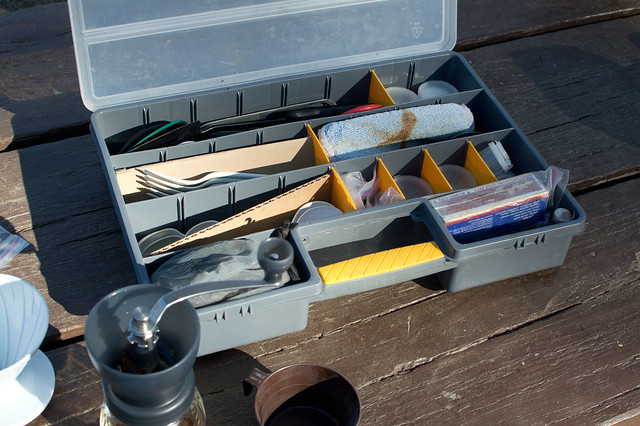
Not necessary, but the above photo is how we store some of the smaller kitchen accessories. It belonged to my parents and it's just a toolbox from Home Depot. It's nice to keep all the small stuff together in one place.
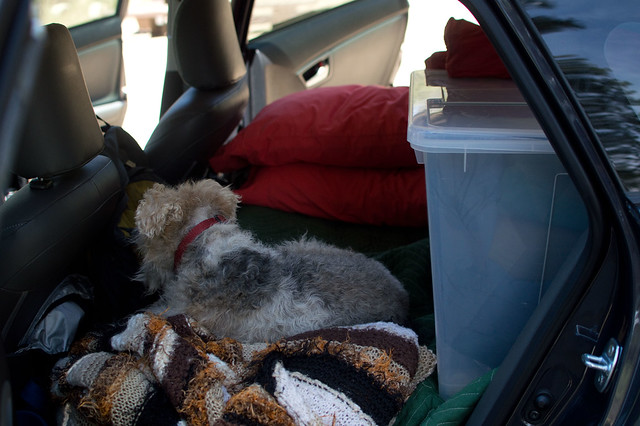
Critical to our car loading considerations - Circe likes a nice empty spot in the backseat for her nest (although she usually then decides to perch precariously on top of the bins or insist on sitting in someone's lap).
And because this post isn't long enough already ...
Sample timeline for our typical one night camping trip (assumes check in is at 2pm, but we'll get out the door earlier if they'll allow early check in):
Saturday:
9:30 am - get up leisurely, eat breakfast, pack clothes, toss bins in the car, grab food out of the fridge, shower. Stop at grocery store for ice and the rest of our list, hit the road by ~ 11am.
~11 am - ~ 2 pm - drive to campsite, possibly stop in cute town on the way if one is available. If we get there too early to check in, we'll park in day parking and explore, but most places are okay letting you in a teeny bit early.
~ 2 pm - Eat lunch, set up camp quickly, hike (or nap, then hike, depending on how tiring the week has been).
~6 pm - Happy hour, fire building, dinner cooking, fireside sitting = evening.
Sunday:
~8:00 am - breakfast
~9:00 am - morning hike
11:00 am - back to camp an hour before check out so that we have plenty of time to break down and pack lunch for the road.
12:00 pm - hit the road.
~3:00 pm - We're usually home by early afternoon and then one of us immediately throws Circe in the tub for a much needed bath while the other person empties the car, washes the dishes and puts away the camping bins. Critical - once we get home we don't stop moving until everything is taken care of (usually takes an hour or so to get everything done, including showers for the humans). That way we can get back to work on Monday without the house being a disaster zone.
~4:30 pm - freshly showered happy hour at home while catching up on Instagram
I'm not saying it's restful, exactly, but now that we have the routine down it feels easy and it is incredibly refreshing. Being out in nature even just for the one night seems to hit a reset button for me.

